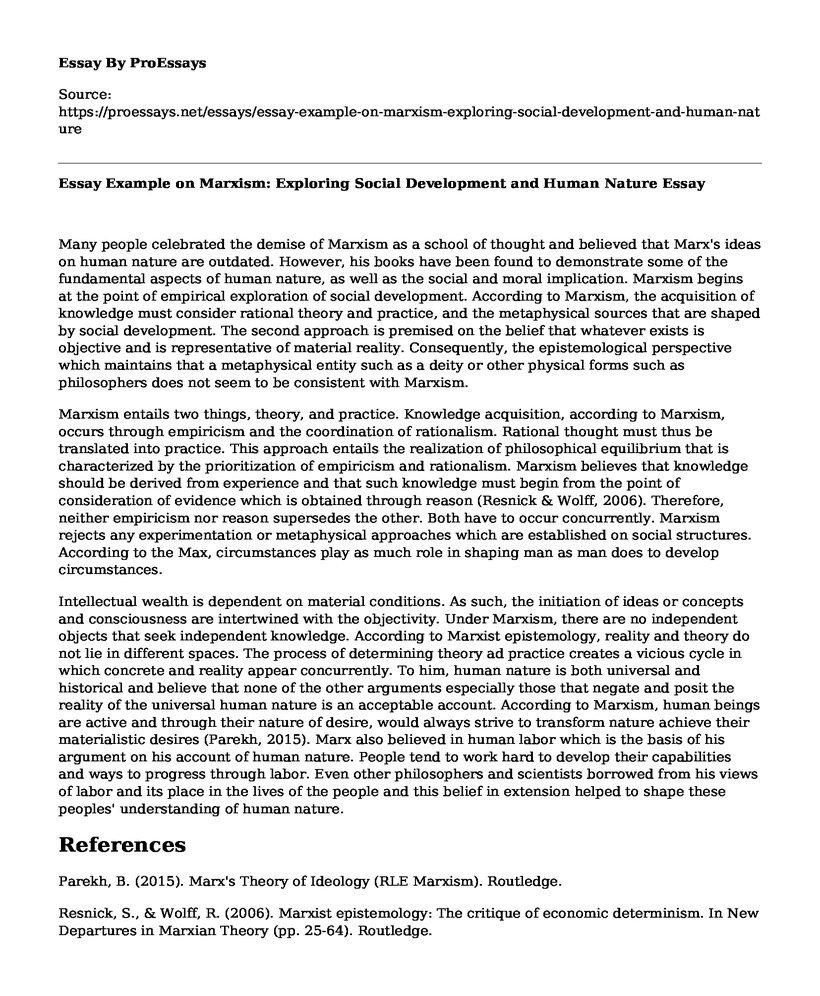Many people celebrated the demise of Marxism as a school of thought and believed that Marx's ideas on human nature are outdated. However, his books have been found to demonstrate some of the fundamental aspects of human nature, as well as the social and moral implication. Marxism begins at the point of empirical exploration of social development. According to Marxism, the acquisition of knowledge must consider rational theory and practice, and the metaphysical sources that are shaped by social development. The second approach is premised on the belief that whatever exists is objective and is representative of material reality. Consequently, the epistemological perspective which maintains that a metaphysical entity such as a deity or other physical forms such as philosophers does not seem to be consistent with Marxism.
Marxism entails two things, theory, and practice. Knowledge acquisition, according to Marxism, occurs through empiricism and the coordination of rationalism. Rational thought must thus be translated into practice. This approach entails the realization of philosophical equilibrium that is characterized by the prioritization of empiricism and rationalism. Marxism believes that knowledge should be derived from experience and that such knowledge must begin from the point of consideration of evidence which is obtained through reason (Resnick & Wolff, 2006). Therefore, neither empiricism nor reason supersedes the other. Both have to occur concurrently. Marxism rejects any experimentation or metaphysical approaches which are established on social structures. According to the Max, circumstances play as much role in shaping man as man does to develop circumstances.
Intellectual wealth is dependent on material conditions. As such, the initiation of ideas or concepts and consciousness are intertwined with the objectivity. Under Marxism, there are no independent objects that seek independent knowledge. According to Marxist epistemology, reality and theory do not lie in different spaces. The process of determining theory ad practice creates a vicious cycle in which concrete and reality appear concurrently. To him, human nature is both universal and historical and believe that none of the other arguments especially those that negate and posit the reality of the universal human nature is an acceptable account. According to Marxism, human beings are active and through their nature of desire, would always strive to transform nature achieve their materialistic desires (Parekh, 2015). Marx also believed in human labor which is the basis of his argument on his account of human nature. People tend to work hard to develop their capabilities and ways to progress through labor. Even other philosophers and scientists borrowed from his views of labor and its place in the lives of the people and this belief in extension helped to shape these peoples' understanding of human nature.
References
Parekh, B. (2015). Marx's Theory of Ideology (RLE Marxism). Routledge.
Resnick, S., & Wolff, R. (2006). Marxist epistemology: The critique of economic determinism. In New Departures in Marxian Theory (pp. 25-64). Routledge.
Cite this page
Essay Example on Marxism: Exploring Social Development and Human Nature. (2023, Jan 02). Retrieved from https://proessays.net/essays/essay-example-on-marxism-exploring-social-development-and-human-nature
If you are the original author of this essay and no longer wish to have it published on the ProEssays website, please click below to request its removal:
- Mortality Attributable to Low Levels of Education in the United States Paper Example
- Managing the Issue of Innovation in UAE Paper Example
- Man's Nature Is Good: Annotated Bibliography
- Tragic Heroes: Noble Birth, Shortcomings, Suffering, and Lessons - Essay Sample
- Free Report Example on Urban Politics: Contesting & Negotiating Urbanization
- Free Report Example: Modernizing Health Policies to Ensure Better Living
- Essay on Ethics in the Realm of Organ Trafficking







